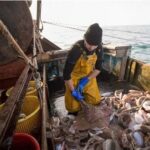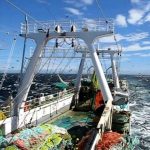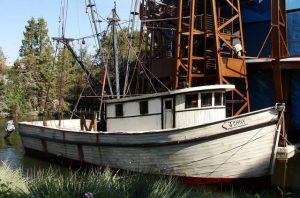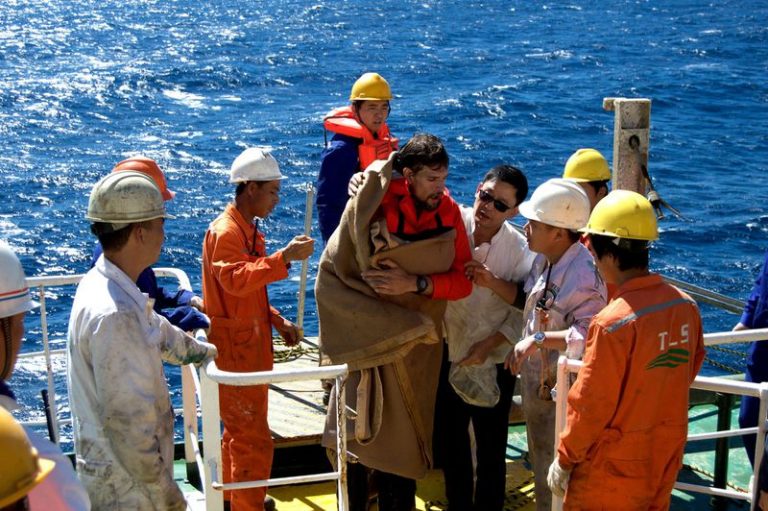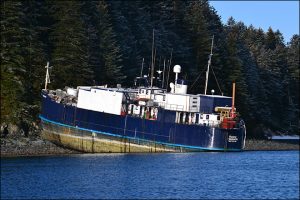Tag Archives: Maine Lobstermen’s Association
Department of Commerce agrees to renegotiate Maine Sea Grant funding
 The U.S. Department of Commerce has agreed to renegotiate funding for the Maine Sea Grant, five days after the National Oceanic and Atmospheric Administration informed the University of Maine that it was discontinuing its funding for the grant. U.S. Commerce Secretary Howard Lutnick has directed NOAA to renegotiate the terms and conditions of the Maine Sea Grant funding agreement after he and his office had conversations with Sen. Susan Collins, Maine’s senior U.S. senator, and her staff. According to Collins, Lutnick wants to ensure the work performed by the Maine Sea Grant focuses on advancing the state’s coastal economies, working waterfronts and sustainable fisheries. more, >>CLICK TO READ<< 10:41
The U.S. Department of Commerce has agreed to renegotiate funding for the Maine Sea Grant, five days after the National Oceanic and Atmospheric Administration informed the University of Maine that it was discontinuing its funding for the grant. U.S. Commerce Secretary Howard Lutnick has directed NOAA to renegotiate the terms and conditions of the Maine Sea Grant funding agreement after he and his office had conversations with Sen. Susan Collins, Maine’s senior U.S. senator, and her staff. According to Collins, Lutnick wants to ensure the work performed by the Maine Sea Grant focuses on advancing the state’s coastal economies, working waterfronts and sustainable fisheries. more, >>CLICK TO READ<< 10:41

A Watchdog Group Told People to Not Buy Maine Lobster. Now It’s Facing a Lawsuit.
A lawsuit related to Maine’s lobster industry is no longer stuck in the claws of the legal system. A federal judge recently ruled that the Maine Lobstermen’s Association and others can proceed with their defamation suit against the nonprofit Seafood Watch, The New York Times reported on Monday. The lobstermen’s group initially sued the nonprofit, which is run by the Monterey Bay Aquarium, almost two years ago, following Seafood Watch’s downgrading of Maine lobster from yellow to red in its sustainability ratings. “This ruling is a crucial step in holding the Monterey Bay Aquarium accountable for misleading statements that have unfairly targeted our industry,” Patrice McCarron, the executive director of the Maine Lobstermen’s Association, said in a statement. more, >>CLICK TO READ<< 11:49
Researchers to monitor socioeconomic resilience of Maine’s lobster fishery
 A University of Maine-led research team has developed new indicators to measure the socioeconomic resilience of Maine’s lobster fishery. The study aims to deepen understanding of the industry’s challenges and guide future policies supporting the fishery and the communities it sustains. Maine’s lobster fishery, supporting thousands of jobs, is closely monitored and managed through biological surveys and industry reports. However, these statistics don’t capture the full impact of supply disruptions, market shifts and geopolitical tensions on the industry and its communities. With commercial lobster landings dropping 27 percent between 2016 and 2022, the Maine Lobstermen’s Association began exploring new ways to measure the fishery’s socioeconomic resilience, helping leaders better respond to the industry’s challenges. more, >>CLICK TO READ<< 05:53
A University of Maine-led research team has developed new indicators to measure the socioeconomic resilience of Maine’s lobster fishery. The study aims to deepen understanding of the industry’s challenges and guide future policies supporting the fishery and the communities it sustains. Maine’s lobster fishery, supporting thousands of jobs, is closely monitored and managed through biological surveys and industry reports. However, these statistics don’t capture the full impact of supply disruptions, market shifts and geopolitical tensions on the industry and its communities. With commercial lobster landings dropping 27 percent between 2016 and 2022, the Maine Lobstermen’s Association began exploring new ways to measure the fishery’s socioeconomic resilience, helping leaders better respond to the industry’s challenges. more, >>CLICK TO READ<< 05:53
Golden, Van Drew introduce bill to guarantee critical Gulf of Maine fishing waters are protected from offshore wind development
 Congressmen Jared Golden (ME-02) and Jeff Van Drew (NJ-02) today introduced the bipartisan Northern Fisheries Heritage Protection Act of 2025. The bill would prohibit commercial offshore wind energy development in Lobster Management Area 1 (LMA1), which includes nearly 14,000 square miles of nearshore fishing waters from the U.S.-Canada maritime border to the north shore of Cape Cod in Massachusetts. “Maine’s fishermen deserve to know that waters critical to our historic, high-value industry are protected — not by promises, but by federal law,” Golden said. “Protecting the bountiful natural resources of LMA1 from development will preserve our way of life, local economies and communities. President Trump’s recent Executive Order provides some measure of reprieve, but we need a more permanent solution.” more, >>CLICK TO READ<< 08:05
Congressmen Jared Golden (ME-02) and Jeff Van Drew (NJ-02) today introduced the bipartisan Northern Fisheries Heritage Protection Act of 2025. The bill would prohibit commercial offshore wind energy development in Lobster Management Area 1 (LMA1), which includes nearly 14,000 square miles of nearshore fishing waters from the U.S.-Canada maritime border to the north shore of Cape Cod in Massachusetts. “Maine’s fishermen deserve to know that waters critical to our historic, high-value industry are protected — not by promises, but by federal law,” Golden said. “Protecting the bountiful natural resources of LMA1 from development will preserve our way of life, local economies and communities. President Trump’s recent Executive Order provides some measure of reprieve, but we need a more permanent solution.” more, >>CLICK TO READ<< 08:05
Retired Lobsterman Arnold “Joe” Alvin Nickerson III of Kennebunkport, Me. has passed away
 Arnold “Joe” Alvin Nickerson III peacefully passed away on December 25, 2024, at the Maine Veterans Home in Scarborough. He was a loving father who cherished his grandchildren, a caring brother and uncle, and admired by all who knew him. Joe was born on December 8, 1934, in Amherst, MA, to Arnold and Anna (Ashman) Nickerson Jr. He grew up in North Amherst, MA, helping on the Ashman family farm. His Uncle Stanley nicknamed him “Hey Joe,” and the name stuck. He shared a special bond with his Lithuanian grandmother, Caroline “Bobute” Ashman. Summers often found him in Cape Porpoise, visiting his grandparents Arnold Sr. and Verna (Fisher), where his love for the ocean began. By age five, he was lobstering with his father and grandfather. more, >>CLICK TO READ<< 11:50
Arnold “Joe” Alvin Nickerson III peacefully passed away on December 25, 2024, at the Maine Veterans Home in Scarborough. He was a loving father who cherished his grandchildren, a caring brother and uncle, and admired by all who knew him. Joe was born on December 8, 1934, in Amherst, MA, to Arnold and Anna (Ashman) Nickerson Jr. He grew up in North Amherst, MA, helping on the Ashman family farm. His Uncle Stanley nicknamed him “Hey Joe,” and the name stuck. He shared a special bond with his Lithuanian grandmother, Caroline “Bobute” Ashman. Summers often found him in Cape Porpoise, visiting his grandparents Arnold Sr. and Verna (Fisher), where his love for the ocean began. By age five, he was lobstering with his father and grandfather. more, >>CLICK TO READ<< 11:50
Regulators delay increase in minimum lobster size till July
 Regulators formally delayed increasing the minimum size of lobsters harvested in the Gulf of Maine to July. The Atlantic States Marine Fisheries Commission, the regulatory body that oversees the fishing industry, voted Monday to delay the resolution by six months. The changes were previously slated to take effect in January, but opponents have argued it would give Canadian lobstermen – unimpacted by the change, though they share the waters – an unfair advantage in the market. Lobstermen also have claimed the change could practically eliminate the harvest of some of the industry’s most popular lobster sizes. more, >>CLICK TO READ<< 21:06
Regulators formally delayed increasing the minimum size of lobsters harvested in the Gulf of Maine to July. The Atlantic States Marine Fisheries Commission, the regulatory body that oversees the fishing industry, voted Monday to delay the resolution by six months. The changes were previously slated to take effect in January, but opponents have argued it would give Canadian lobstermen – unimpacted by the change, though they share the waters – an unfair advantage in the market. Lobstermen also have claimed the change could practically eliminate the harvest of some of the industry’s most popular lobster sizes. more, >>CLICK TO READ<< 21:06
Rare whale died of chronic entanglement in Maine fishing gear
 The North Atlantic right whale was found dead off Martha’s Vineyard in January. The whales are declining in population and are at the center of efforts to more tightly regulate shipping and commercial fishing off the East Coast. “The fact is we know that entanglement in Maine gear is extremely rare. This is the first reported entanglement of a right whale in Maine lobster gear in 20 years and the first death attributed to the fishery,” the Maine Lobstermen’s Association said in a statement. “Maine lobstermen have made significant changes to how they fish over the last 25 years to avoid entanglement.” more, >>CLICK TO READ<< 06:55
The North Atlantic right whale was found dead off Martha’s Vineyard in January. The whales are declining in population and are at the center of efforts to more tightly regulate shipping and commercial fishing off the East Coast. “The fact is we know that entanglement in Maine gear is extremely rare. This is the first reported entanglement of a right whale in Maine lobster gear in 20 years and the first death attributed to the fishery,” the Maine Lobstermen’s Association said in a statement. “Maine lobstermen have made significant changes to how they fish over the last 25 years to avoid entanglement.” more, >>CLICK TO READ<< 06:55
Lobster harvesters ready to ‘take matters into their own hands’
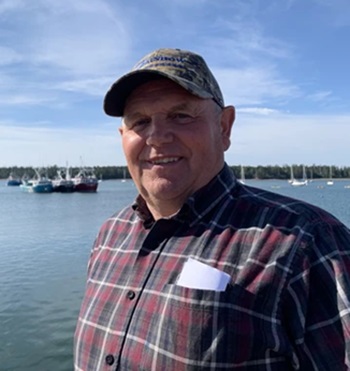 Local lobster harvesters are prepared to patrol waters themselves and haul up illegal gear, which could spark confrontations with poachers, according to Amanda Johnson, executive director of the Fundy North Fishermen’s Association, which represents 150 lobster fishers from St. Stephen to Alma. “It could lead to a lot of violence on the water,” Johnson said at a protest held in Saint Andrews Saturday in support of local fishers and their families. Maine and New Brunswick poachers are now taking to Lobster Fishing Area 36, which runs along New Brunswick’s Bay of Fundy coast from Alma to the American border, ahead of its November season, Johnson said. Deer Island fisherman Dale Mitchell claims lobster catches have dropped 30 per cent in the last seven years since the start of what he called an “illegal summer fishery” in the region. more, >>CLICK TO READ<< 08:06
Local lobster harvesters are prepared to patrol waters themselves and haul up illegal gear, which could spark confrontations with poachers, according to Amanda Johnson, executive director of the Fundy North Fishermen’s Association, which represents 150 lobster fishers from St. Stephen to Alma. “It could lead to a lot of violence on the water,” Johnson said at a protest held in Saint Andrews Saturday in support of local fishers and their families. Maine and New Brunswick poachers are now taking to Lobster Fishing Area 36, which runs along New Brunswick’s Bay of Fundy coast from Alma to the American border, ahead of its November season, Johnson said. Deer Island fisherman Dale Mitchell claims lobster catches have dropped 30 per cent in the last seven years since the start of what he called an “illegal summer fishery” in the region. more, >>CLICK TO READ<< 08:06
No one stopping Maine fishers from poaching N.B. lobster: group
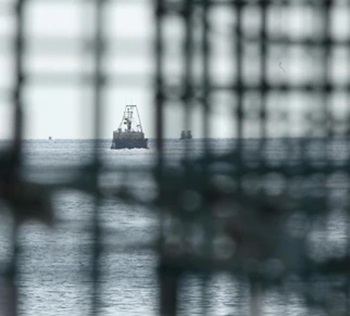 Amanda Johnson, executive director of the Fundy North Fishermen’s Association, says a border boundary dispute has long seen U.S. fishermen sneaking across from Maine to set traps inside Canadian waters. But she says it’s now not being stopped as Canadian fisheries officers aren’t conducting enforcement patrols. That has Johnson worried about overfishing ahead of the New Brunswick south shore’s November lobster fishing season, but also for the safety of New Brunswick fishers fearing the potential for looming confrontations on the water. “Right now, the main issue is that there are no fisheries officers patrolling the water in southwest New Brunswick,” Johnson said. “They are kind of on strike, same as they are in southwest Nova Scotia, and DFO isn’t really disclosing who is on strike and who isn’t. more, >>CLICK TO READ<< 18:15
Amanda Johnson, executive director of the Fundy North Fishermen’s Association, says a border boundary dispute has long seen U.S. fishermen sneaking across from Maine to set traps inside Canadian waters. But she says it’s now not being stopped as Canadian fisheries officers aren’t conducting enforcement patrols. That has Johnson worried about overfishing ahead of the New Brunswick south shore’s November lobster fishing season, but also for the safety of New Brunswick fishers fearing the potential for looming confrontations on the water. “Right now, the main issue is that there are no fisheries officers patrolling the water in southwest New Brunswick,” Johnson said. “They are kind of on strike, same as they are in southwest Nova Scotia, and DFO isn’t really disclosing who is on strike and who isn’t. more, >>CLICK TO READ<< 18:15
Maine Lobstermen’s Association letter to ASMFC reiterates its call to delay any gauge increase
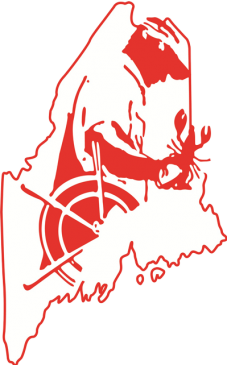 Dear Ms. Starks: The Maine Lobstermen’s Association (MLA) strongly supports the Atlantic States Marine Fisheries Commission’s (ASMFC) recommendation to NOAA Fisheries proposed in Addendum XXX “that as changes to the minimum gauge size in LCMA 1 are required by Addendum XXVII, the smallest minimum size for foreign imports would match the smallest minimum size in effect for the US industry.” MLA has raised concern with ASMFC through previous comments and letters that the lack of clarity in Addendum XXVII regarding the import of undersize lobster from Canada smaller than the minimum possession size has created significant confusion and angst amongst Maine lobstermen who worry that the import these lobsters would have a significant negative impact on the U.S. boat price. more, >>CLICK TO READ<< 14:06
Dear Ms. Starks: The Maine Lobstermen’s Association (MLA) strongly supports the Atlantic States Marine Fisheries Commission’s (ASMFC) recommendation to NOAA Fisheries proposed in Addendum XXX “that as changes to the minimum gauge size in LCMA 1 are required by Addendum XXVII, the smallest minimum size for foreign imports would match the smallest minimum size in effect for the US industry.” MLA has raised concern with ASMFC through previous comments and letters that the lack of clarity in Addendum XXVII regarding the import of undersize lobster from Canada smaller than the minimum possession size has created significant confusion and angst amongst Maine lobstermen who worry that the import these lobsters would have a significant negative impact on the U.S. boat price. more, >>CLICK TO READ<< 14:06
A whale washed up dead. Greens blame a Democrat.
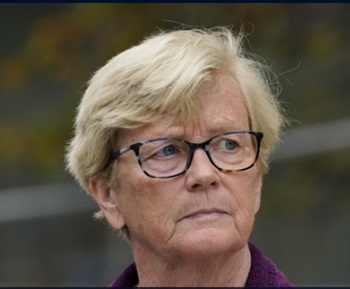 Environmentalists say Chellie Pingree’s defense of the Maine lobster industry could imperil a critically endangered whale. Doing what greens want would likely send the Democrat to political extinction. Conservation advocates are publicly pressuring Pingree to overturn a law that protects Maine’s prized lobster fishery. The calls come after one of only 360 remaining North Atlantic right whales washed up dead in February entangled in Maine lobstering rope. “I think it is a little bit more of a black mark on an otherwise fairly good conservation record,” said Brett Hartl, the government affairs director at the Center for Biological Diversity, on Pingree’s support of the pro-lobstering law. It’s a rare rebuke of a longtime ally who has a near-pristine voting record on environmental issues. Pingree says she has no plans to reverse course, but the incident highlights how lawmakers continue to balance environmental concerns with the everyday lives of their constituents. more, >>CLICK TO READ<< 17:57
Environmentalists say Chellie Pingree’s defense of the Maine lobster industry could imperil a critically endangered whale. Doing what greens want would likely send the Democrat to political extinction. Conservation advocates are publicly pressuring Pingree to overturn a law that protects Maine’s prized lobster fishery. The calls come after one of only 360 remaining North Atlantic right whales washed up dead in February entangled in Maine lobstering rope. “I think it is a little bit more of a black mark on an otherwise fairly good conservation record,” said Brett Hartl, the government affairs director at the Center for Biological Diversity, on Pingree’s support of the pro-lobstering law. It’s a rare rebuke of a longtime ally who has a near-pristine voting record on environmental issues. Pingree says she has no plans to reverse course, but the incident highlights how lawmakers continue to balance environmental concerns with the everyday lives of their constituents. more, >>CLICK TO READ<< 17:57
Seventh-generation fisherman Carlton Elbridge Joyce of Swans Island, Me. has passed away
 Carlton Elbridge Joyce peacefully left for his heavenly home on Sunday, May 5, 2024, while his family kept vigil at MDI Hospital. Though strong at 85, he could not overcome an aggressive bladder cancer that was diagnosed in February. Born on March 17, 1939, in Rockland, to Robert McKay Joyce and Roberta Laverne (Simmons) Joyce, Carlton was raised on Swan’s Island with his younger siblings Sharon, Bonnie, Laverne, and Matthew. He joined the military and was proud of his service with the United States Army. His favorite stories from his time in Germany included his first captivating glance of the beautiful Army girl from Hawaii. On May 24,1962, he married the love of his life and brought her to his island on the other side of the world. Together for 61 years, they built a life they loved in a place he called paradise. His undying devotion and admiration for his wife is a legacy of love for his family. A seventh-generation fisherman, Carlton had a passion and keen instinct for lobstering and the fishing industry. He loved everything about his life on the water. His last boat was designed for Pacita’s comfort and together they lived out their working days with a tenacity that sustained their fishing career through the fall of 2023. more, >>CLICK TO READ<< 11:38
Carlton Elbridge Joyce peacefully left for his heavenly home on Sunday, May 5, 2024, while his family kept vigil at MDI Hospital. Though strong at 85, he could not overcome an aggressive bladder cancer that was diagnosed in February. Born on March 17, 1939, in Rockland, to Robert McKay Joyce and Roberta Laverne (Simmons) Joyce, Carlton was raised on Swan’s Island with his younger siblings Sharon, Bonnie, Laverne, and Matthew. He joined the military and was proud of his service with the United States Army. His favorite stories from his time in Germany included his first captivating glance of the beautiful Army girl from Hawaii. On May 24,1962, he married the love of his life and brought her to his island on the other side of the world. Together for 61 years, they built a life they loved in a place he called paradise. His undying devotion and admiration for his wife is a legacy of love for his family. A seventh-generation fisherman, Carlton had a passion and keen instinct for lobstering and the fishing industry. He loved everything about his life on the water. His last boat was designed for Pacita’s comfort and together they lived out their working days with a tenacity that sustained their fishing career through the fall of 2023. more, >>CLICK TO READ<< 11:38
Federal Government Picks New England Offshore Wind Power Site, Drawing Cheers and Questions Alike
 The federal government on Friday designated a large area off the New England coast for offshore wind production development, setting the stage for a possible lease sale within the Gulf of Maine. The U.S. Bureau of Ocean Energy Management said in a statement that the New England zone, which renewable energy advocates have identified as crucial for the growth of wind power, “avoids important areas for lobster fishing, North Atlantic right whale habitat, and other important fishing areas and habitats.” The move came a day after the country’s first commercial-scale offshore wind farm opened off Montauk Point, New York. Environmental groups cheered the announcement, but some members of the commercial fishing industry, which has opposed wind development in areas where they trap lobsters, said they still have concerns about locating offshore wind in the area. more, >>click to read<< 12:23
The federal government on Friday designated a large area off the New England coast for offshore wind production development, setting the stage for a possible lease sale within the Gulf of Maine. The U.S. Bureau of Ocean Energy Management said in a statement that the New England zone, which renewable energy advocates have identified as crucial for the growth of wind power, “avoids important areas for lobster fishing, North Atlantic right whale habitat, and other important fishing areas and habitats.” The move came a day after the country’s first commercial-scale offshore wind farm opened off Montauk Point, New York. Environmental groups cheered the announcement, but some members of the commercial fishing industry, which has opposed wind development in areas where they trap lobsters, said they still have concerns about locating offshore wind in the area. more, >>click to read<< 12:23
Maine Lobstermen’s Association Releases Statement on Final Wind Energy Area
 “The Maine Lobstermen’s Association (MLA) appreciates that BOEM’s Final Wind Energy Area (WEA) removes Lobster Management Area 1. “MLA worked tirelessly with Maine’s fishing industry, our congressional delegation, and Governor Mills to ensure prime lobster fishing grounds are spared from industrial development. We are proud that so many lobstermen have constructively engaged in this process and grateful that the Bureau of Ocean Energy Management has listened to their concerns. “But there is still much work to do. Secondary Area C, an area where many endangered North Atlantic right whales are sighted, is included in the Final Wind Energy Area. MLA remains steadfast in its position that no area of the Gulf of Maine should be industrialized with offshore wind. There are still too many unanswered questions about the impacts of offshore wind on the marine environment, commercial fishermen and our fishing heritage.” https://www.mainelobstermen.org/ 12:57
“The Maine Lobstermen’s Association (MLA) appreciates that BOEM’s Final Wind Energy Area (WEA) removes Lobster Management Area 1. “MLA worked tirelessly with Maine’s fishing industry, our congressional delegation, and Governor Mills to ensure prime lobster fishing grounds are spared from industrial development. We are proud that so many lobstermen have constructively engaged in this process and grateful that the Bureau of Ocean Energy Management has listened to their concerns. “But there is still much work to do. Secondary Area C, an area where many endangered North Atlantic right whales are sighted, is included in the Final Wind Energy Area. MLA remains steadfast in its position that no area of the Gulf of Maine should be industrialized with offshore wind. There are still too many unanswered questions about the impacts of offshore wind on the marine environment, commercial fishermen and our fishing heritage.” https://www.mainelobstermen.org/ 12:57
Feds announce areas where offshore wind can go in Gulf of Maine
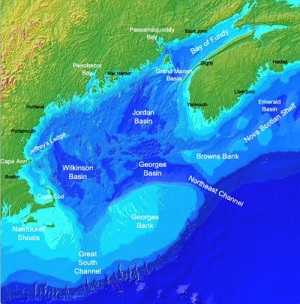 Federal regulators have made a final designation of roughly 2 million acres in the Gulf of Maine where offshore wind turbines can be deployed to help provide power to New England. The boundary set by the Bureau of Ocean Energy Management does not include any part of the federal lobster management area 1. That fishing area extends from state waters about three miles offshore to about 40 miles. The closest the designated federal wind energy area comes to Maine’s coast is just outside the fishing zone. The Maine Lobstermen’s Association said Friday that it appreciates that the fishing zone is excluded from the wind area approved by BOEM. But it said that it remains “steadfast” in its position that industrial wind power development does not belong anywhere in the Gulf of Maine. more, >>click to read<< 12:39
Federal regulators have made a final designation of roughly 2 million acres in the Gulf of Maine where offshore wind turbines can be deployed to help provide power to New England. The boundary set by the Bureau of Ocean Energy Management does not include any part of the federal lobster management area 1. That fishing area extends from state waters about three miles offshore to about 40 miles. The closest the designated federal wind energy area comes to Maine’s coast is just outside the fishing zone. The Maine Lobstermen’s Association said Friday that it appreciates that the fishing zone is excluded from the wind area approved by BOEM. But it said that it remains “steadfast” in its position that industrial wind power development does not belong anywhere in the Gulf of Maine. more, >>click to read<< 12:39
Maine lobstermen will not be scapegoated over right whale
 New England fishermen are bracing themselves for another salvo of regulation and activist pressure after the tragic entanglement death of a right whale that washed ashore on Martha’s Vineyard. While the future of our fisheries is uncertain, 2023 showed how much resilience and determination there is in our maritime communities. My organization – the New England Fishermen’s Stewardship Association – and our many partners are prepared to ward off any attempt to scapegoat Maine lobstermen for the declining population of the majestic right whale. Regulators and out-of-state agitators are together impugning one of the most sustainable fisheries in the world for right whale deaths. Their claims are baseless and contradicted by their own data. As agencies and NGOs ponder next steps, they might consider the fighting spirit this last year has showcased among fishermen. more, >>click to read<< by Dustin Delano 12:06
New England fishermen are bracing themselves for another salvo of regulation and activist pressure after the tragic entanglement death of a right whale that washed ashore on Martha’s Vineyard. While the future of our fisheries is uncertain, 2023 showed how much resilience and determination there is in our maritime communities. My organization – the New England Fishermen’s Stewardship Association – and our many partners are prepared to ward off any attempt to scapegoat Maine lobstermen for the declining population of the majestic right whale. Regulators and out-of-state agitators are together impugning one of the most sustainable fisheries in the world for right whale deaths. Their claims are baseless and contradicted by their own data. As agencies and NGOs ponder next steps, they might consider the fighting spirit this last year has showcased among fishermen. more, >>click to read<< by Dustin Delano 12:06
Maine Lobstermen’s Association tallies its victories, future risks at annual meeting
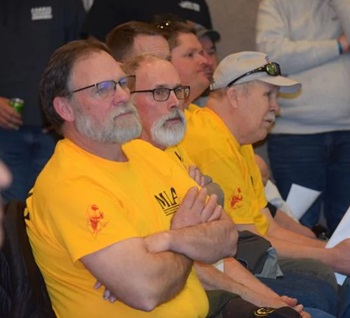 “Every year, there is a new issue facing the industry,” Tristan Porter, president of the Maine Lobstermen’s Association (MLA), said as the trade organization opened its 70th annual meeting during the Maine Fishermen’s Forum on March 1. For lobstermen and the commercial lobster fishery, there are three big issues facing the industry: protecting North Atlantic right whales, maintaining a sustainable fishery and the federal leasing in the Gulf of Maine for floating offshore wind energy — plus the myriad of federal and state regulations and public hearings and, at times, lawsuits, that go with them. 8 photos, more, >>click to read<< 08:44
“Every year, there is a new issue facing the industry,” Tristan Porter, president of the Maine Lobstermen’s Association (MLA), said as the trade organization opened its 70th annual meeting during the Maine Fishermen’s Forum on March 1. For lobstermen and the commercial lobster fishery, there are three big issues facing the industry: protecting North Atlantic right whales, maintaining a sustainable fishery and the federal leasing in the Gulf of Maine for floating offshore wind energy — plus the myriad of federal and state regulations and public hearings and, at times, lawsuits, that go with them. 8 photos, more, >>click to read<< 08:44
Maine lobstermen made more money in 2023 despite catching fewest lobster in 15 years
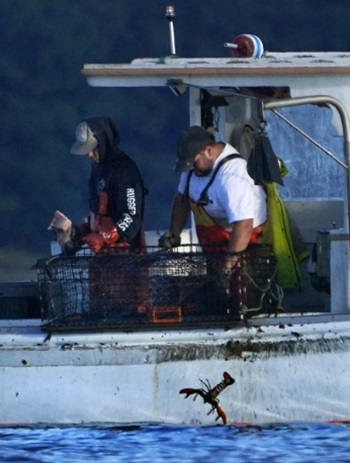 Maine lobstermen raked in $464.4 million at the docks last year, rebounding from the worst year the fishery had seen in a decade, according to an annual report from the Maine Department of Marine Resources released Friday. The dwindling number of landings isn’t necessarily a surprise, though. State officials and members of the lobstering community say the decrease reflects the impacts of high costs to operate the fishery last year. And the dip in poundage indicates how lobstermen navigated the challenging obstacles.“Fishermen are now very strategic about how they fish. Expenses are through the roof, so you can’t afford to be out if you’re not making money,” said Patrice McCarron, a lobsterman and policy director with the Maine Lobstermen’s Association. more, >>click to read<< 16:26
Maine lobstermen raked in $464.4 million at the docks last year, rebounding from the worst year the fishery had seen in a decade, according to an annual report from the Maine Department of Marine Resources released Friday. The dwindling number of landings isn’t necessarily a surprise, though. State officials and members of the lobstering community say the decrease reflects the impacts of high costs to operate the fishery last year. And the dip in poundage indicates how lobstermen navigated the challenging obstacles.“Fishermen are now very strategic about how they fish. Expenses are through the roof, so you can’t afford to be out if you’re not making money,” said Patrice McCarron, a lobsterman and policy director with the Maine Lobstermen’s Association. more, >>click to read<< 16:26
Statement from Maine Lobstermen’s Association on Right Whale death
 “The Maine Lobstermen’s Association (MLA) is deeply saddened by the death of a juvenile right whale that NMFS has attributed to the Maine fishery. We know that entanglement in Maine gear is extremely rare. This is the first reported entanglement of a right whale in Maine lobster gear in 20 years and the first death attributed to the fishery. Maine lobstermen have made significant changes to how they fish over the last 25 years to avoid entanglement and continue gear testing. The MLA will continue this important work as we review the data and evidence that NMFS has collected. MLA remains committed to finding a solution to ensure a future for right whales and Maine’s lobster fishery”. 16:50
“The Maine Lobstermen’s Association (MLA) is deeply saddened by the death of a juvenile right whale that NMFS has attributed to the Maine fishery. We know that entanglement in Maine gear is extremely rare. This is the first reported entanglement of a right whale in Maine lobster gear in 20 years and the first death attributed to the fishery. Maine lobstermen have made significant changes to how they fish over the last 25 years to avoid entanglement and continue gear testing. The MLA will continue this important work as we review the data and evidence that NMFS has collected. MLA remains committed to finding a solution to ensure a future for right whales and Maine’s lobster fishery”. 16:50
A treasured industry and an endangered species compete for survival
 On a cold morning in January, Chris Welch is already out preparing his boat. This time of year, his days begin before sunrise. It’s a ritual he’s grown accustomed to — at just 35 years old, he’s already spent decades working in the lobster business. “I started lobstering when I was six.” Welch said. Being a lobsterman in Maine is less of a job and more of a lifestyle. It’s a family business for many, including Welch, whose learned the ropes from his grandfather. But recently, the focus is less on what lobstermen’s ropes are pulling up and more on what may be running into them. Video, more, >>click to read<< 10:23
On a cold morning in January, Chris Welch is already out preparing his boat. This time of year, his days begin before sunrise. It’s a ritual he’s grown accustomed to — at just 35 years old, he’s already spent decades working in the lobster business. “I started lobstering when I was six.” Welch said. Being a lobsterman in Maine is less of a job and more of a lifestyle. It’s a family business for many, including Welch, whose learned the ropes from his grandfather. But recently, the focus is less on what lobstermen’s ropes are pulling up and more on what may be running into them. Video, more, >>click to read<< 10:23
Following Legal Victory for Maine Lobstermen’s Association, State Receives $17 Million from NOAA to Improve Data on Right Whale
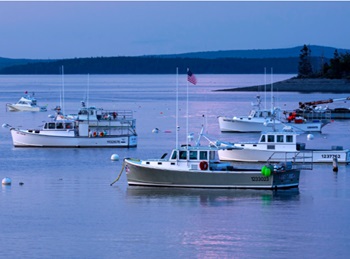 This federal funding comes just months after the federal court of appeals ruled in favor of the Maine Lobstermen’s Association (MLA) in their lawsuit against the National Marine Fisheries Service (NMFS) — a subagency of NOAA — for adopting improperly-founded regulations against the industry. In September of 2021, the MLA filed a lawsuit against the agency alleging that their efforts to protect the NARW were unlawful, as the regulations promulgated were founded upon a “simplistic and false premise” that “exaggerates and arbitrarily inflates the risk posed by the Maine lobster fishery.” The MLA stated that the NOAA’s analyses was “unlawful” as they “did not rely on the best available scientific information, made erroneous and arbitrary assumptions unsupported and contradicted by data and evidence, relied on an outdated and flawed methodology to model projections of the North Atlantic right whale population, and inexplicably failed to account for either the positive impact of mitigation measures already or soon-to-be employed by the Maine lobster fishery.” more, >>click to read<< 07:09
This federal funding comes just months after the federal court of appeals ruled in favor of the Maine Lobstermen’s Association (MLA) in their lawsuit against the National Marine Fisheries Service (NMFS) — a subagency of NOAA — for adopting improperly-founded regulations against the industry. In September of 2021, the MLA filed a lawsuit against the agency alleging that their efforts to protect the NARW were unlawful, as the regulations promulgated were founded upon a “simplistic and false premise” that “exaggerates and arbitrarily inflates the risk posed by the Maine lobster fishery.” The MLA stated that the NOAA’s analyses was “unlawful” as they “did not rely on the best available scientific information, made erroneous and arbitrary assumptions unsupported and contradicted by data and evidence, relied on an outdated and flawed methodology to model projections of the North Atlantic right whale population, and inexplicably failed to account for either the positive impact of mitigation measures already or soon-to-be employed by the Maine lobster fishery.” more, >>click to read<< 07:09
Dec 15 deadline nears for lobster boat tracking devices in federal waters
![]() Maine lobstermen who fish in federal waters have only a few weeks left until the Dec. 15 deadline to install and activate recently distributed tracking devices on their boats to comply with a regulation of the Atlantic State Marine Fisheries Commission (ASMFC). The Particle One devices were sent by Maine’s Department of Marine Resources (DMR) with an accompanying letter of explanation. As required by the ASMFC regulation approved last year, each minute the boat is moving, the tracker will collect both the time and its position. The device will also monitor a boat when it is tied up every six hours until it moves again. Local lobstermen are concerned monitoring their locations infringes on their privacy, while ASMFC believes it will be useful information to have. Some lobstermen have returned the trackers to DMR. >>click to read<< 13:02
Maine lobstermen who fish in federal waters have only a few weeks left until the Dec. 15 deadline to install and activate recently distributed tracking devices on their boats to comply with a regulation of the Atlantic State Marine Fisheries Commission (ASMFC). The Particle One devices were sent by Maine’s Department of Marine Resources (DMR) with an accompanying letter of explanation. As required by the ASMFC regulation approved last year, each minute the boat is moving, the tracker will collect both the time and its position. The device will also monitor a boat when it is tied up every six hours until it moves again. Local lobstermen are concerned monitoring their locations infringes on their privacy, while ASMFC believes it will be useful information to have. Some lobstermen have returned the trackers to DMR. >>click to read<< 13:02
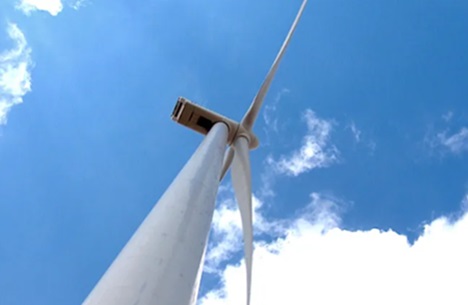
Fishermen in Maine lobbied to keep wind farms out of crucial fishing grounds. Will it happen in N.S.?
A no-compromise lobbying campaign by Maine lobster harvesters has helped keep wind farms out of a crucial lobster fishing area in the Gulf of Maine. And that has some fishermen in Nova Scotia casting an envious eye south of the border. “I’m pleased to see that happen in Maine. We’d like to see the same sort of diligence taken in Nova Scotia,” said Tommy Amirault, a fisherman from Pubnico and president of the Coldwater Lobster Association. “Maine obviously has concerns. It would be nice to 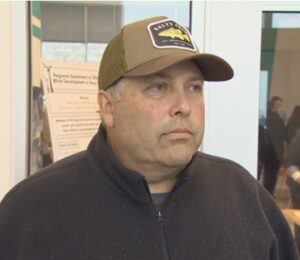 see both provincial and federal governments take our concerns into practice,” Amirault said. “We didn’t mince words that we opposed offshore wind anywhere in the Gulf of Maine. It’s one of the most productive ecosystems in the world. And we really didn’t think that this is the place to solve the renewable energy crisis,” said McCarron. In Nova Scotia, the process has just begun. He said it’s no surprise fishermen have concerns about where it happens. >>click to read<< 06:57
see both provincial and federal governments take our concerns into practice,” Amirault said. “We didn’t mince words that we opposed offshore wind anywhere in the Gulf of Maine. It’s one of the most productive ecosystems in the world. And we really didn’t think that this is the place to solve the renewable energy crisis,” said McCarron. In Nova Scotia, the process has just begun. He said it’s no surprise fishermen have concerns about where it happens. >>click to read<< 06:57
Maine State Chamber of Commerce puts spotlight on lobster
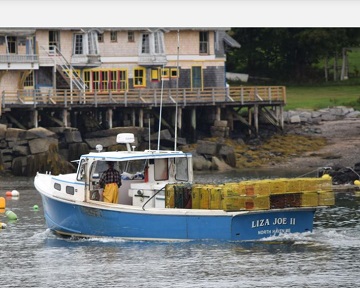 Maine lobster contributes $1.4 billion to the state economy and 4,000 jobs on the shore, from live lobster dealers to processors to workers on the piers. And those numbers don’t include lobster-based tourism, Linda Caprara, interim CEO of the Maine State Chamber of Commerce, noted Sept. 28 in an online panel discussion in honor of Maine Lobster Week. Then, there are the 5,000 licensed lobstermen and their crew who all earn their livelihood on the water. Last year, just below 100 million pounds of lobster landed on docks from Portland to Lubec with a value of about $390 million. “We’re catching a lot of lobster,” said Marianne LaCroix, executive director of the Maine Lobster Marketing Collaborative. >>click to read<< 08:51
Maine lobster contributes $1.4 billion to the state economy and 4,000 jobs on the shore, from live lobster dealers to processors to workers on the piers. And those numbers don’t include lobster-based tourism, Linda Caprara, interim CEO of the Maine State Chamber of Commerce, noted Sept. 28 in an online panel discussion in honor of Maine Lobster Week. Then, there are the 5,000 licensed lobstermen and their crew who all earn their livelihood on the water. Last year, just below 100 million pounds of lobster landed on docks from Portland to Lubec with a value of about $390 million. “We’re catching a lot of lobster,” said Marianne LaCroix, executive director of the Maine Lobster Marketing Collaborative. >>click to read<< 08:51
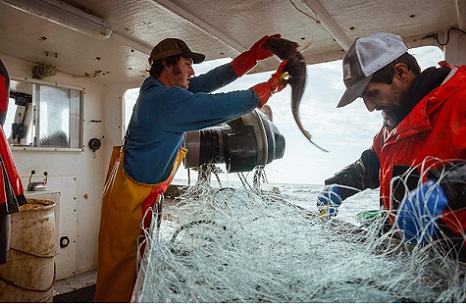
Experts fear American fishing industry, boating at risk as Biden prioritizes climate, green energy
The Biden administration has prioritized green energy at the expense of endangered whales and the U.S. fishing industry with regulation that limits both commercial fishing and recreational boating, according to experts. As they are imposing more regulations, they are also promoting offshore wind, which is actually harming commercial and recreational boating and potentially killing whales, Brady and Lapp said. “They positioned us as being these evildoers and now, 20 years later, whales are dropping dead like pigeons in Manhattan,” Brady said. “Here commercial fishermen and coastal communities are at the front line of fighting to protect the ocean itself, and we have crickets from virtually every NGO.” Video, >>click to read<< 09:09
Fishermen’s Alliance Highlights Offshore Wind Threat to Haddock, Lobster Fisheries in Gulf of Maine
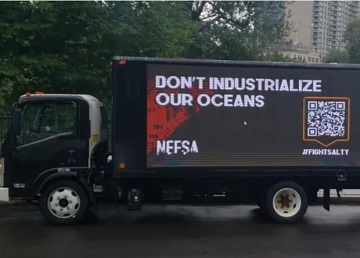 An alliance of groups representing New England’s fishermen is highlighting scientific research that suggests offshore wind development could have “population-scale effects” on key fish and crustacean species in the Gulf of Maine, including electromagnetism-induced deformities in lobsters. The New England Fishermen’s Stewardship Association (NEFSA) on Monday released an “Offshore Wind Research Summary” summarizing the existing scientific research on the environmental impact of offshore wind power development. The scientific evidence, they believe, shows that offshore wind development would have unpredictable and potentially harmful consequences for key marine species, such as lobster and haddock. >click to read< 17:37
An alliance of groups representing New England’s fishermen is highlighting scientific research that suggests offshore wind development could have “population-scale effects” on key fish and crustacean species in the Gulf of Maine, including electromagnetism-induced deformities in lobsters. The New England Fishermen’s Stewardship Association (NEFSA) on Monday released an “Offshore Wind Research Summary” summarizing the existing scientific research on the environmental impact of offshore wind power development. The scientific evidence, they believe, shows that offshore wind development would have unpredictable and potentially harmful consequences for key marine species, such as lobster and haddock. >click to read< 17:37
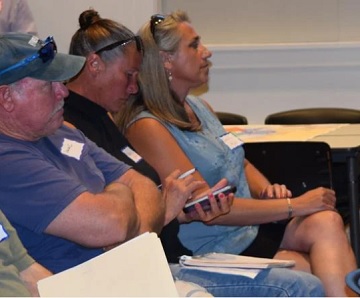
Maine Fishermen, scientists find flaws in potential wind energy lease areas
BOEM officials called the meeting to review newly released draft maps of where federal leases could be offered in the Gulf of Maine, known as the “call” area. They wanted fishermen’s feedback to see where the maps fell short based on what fishermen know from working on the water. “This is very difficult for our industry to face,” said Dustin Delano, New England Fishermen Stewardship’s chief operating officer, former vice president of the Maine Lobster Association and a fourth-generation lobsterman out of Friendship. “A lot of us feel this is going to wipe us off the map.” The fishermen present were unconvinced but resigned. >click to read< 07:55
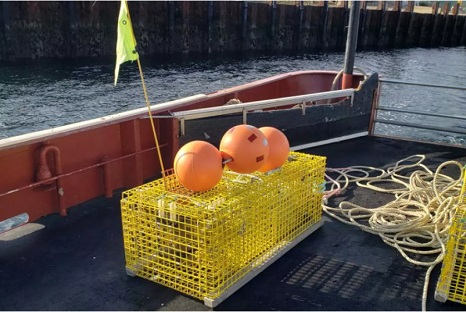
NOAA wants to expand ‘ropeless’ fishing gear pilot to include some Maine lobstermen
Last winter as part of a pilot project, some Massachusetts lobstermen were allowed to fish in areas that are seasonally closed to protect endangered North Atlantic right whales. But they had to use so-called “on-demand” or “ropeless” fishing gear and work with the National Oceanic and Atmospheric Administration to share their feedback. Now NOAA wants to expand the program to include lobster and other fixed-gear fishermen throughout New England. Federal officials have proposed issuing permits to more than 200 people, with priority given to those who fish closed areas during the winter. More than 100 people in Maine fish those closed areas. And fishermen aren’t thrilled with the idea of opening access to only some of them, said Patrice McCarron of the Maine Lobstermen’s Association — unless there’s enough on-demand gear to go around to everyone. >click to read< 10:00
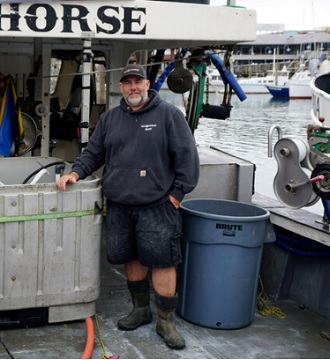
This fishing gear can help save whales. What will it take for fishermen to use it?
Fishing boats would normally still be unloading Dungeness crabs at San Francisco’s fisherman’s wharf in May. This year, the docks were quiet, except for one berth. “We’re the only boat right now,” says Brand Little, standing next to a large tank of bright red crabs on the deck of his boat, the Pale Horse. State regulators closed the Dungeness season two months early this year, due to the arrival of humpback whales in the area. On both the East and West Coasts, crab and lobster fishermen are seeing their fishing seasons shrink over concerns that whales are getting entangled in the long ropes attached to their gear, accidents that often end up injuring or killing the animals. Photos, >click to read< 08:08
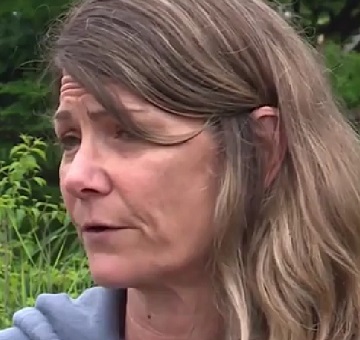
Federal judges: Data does not prove Maine lobstering endangers whales
Friday, a panel of judges ruled that data on entanglements in lobster fishing gear does not support the need for the new strict limits on where and how lobstermen could fish. Those regulations, set by the National Marine Fisheries Service, were put in place under the authority of the Endangered Species Act to protect the 340 North Atlantic Right Whales whales left. The Maine Lobstermen’s Association says there is no evidence of Maine lobster gear ever killing a whale. There has been no documented entanglement of a North Atlantic Right Whale since 2004. “Every lobsterman in Maine was facing a decision of whether or not they would be able to continue in the fishery,” MLA policy director Patrice McCarron said. Video, >click to read< 08:55


































